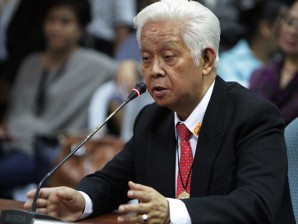Brillantes defends airtime limit rule

Comelec Chairman Sixto Brillantes Jr. INQUIRER MANILA, Philippines – The Commission on Elections (Comelec) en banc defended its resolution on campaign rules and regulations during a public hearing Thursday morning against media networks.
MANILA, Philippines – The Commission on Elections (Comelec) en banc defended its resolution on campaign rules and regulations during a public hearing Thursday morning against media networks.
GMA Network Inc. and the Kapisanan ng mga Brodkaster ng Pilipinas (KBP) had previously filed separate letters to the Comelec asking them to clarify or remove certain provisions of Comelec resolution No. 9615.
They pointed to the provisions in the resolution promulgated on January 15, 2013 limiting airtime for broadcast election propaganda, candidates’ Right to Reply, and the requirement to get prior approval before candidates can be invited as guests to broadcast programs.
Comelec Chairman Sixto Brillantes Jr., told reporters after hearing arguments of the networks that they will study the points raised and would likely issue a clarification on their resolution by next week.
“Definitely there will be changes [but] I don’t think it will be major,” Brillantes said. They held a special en banc session in the afternoon so as to clarify some of the technical aspects that were unclear with them.
Article continues after this advertisementBoth GMA Network and the KBP argued that the airtime limit of 120 minutes for television and 180 minutes for radio will restrict the amount of exposure for candidates to present themselves to the public and allow them to make an informed decision on who they will vote.
Article continues after this advertisementBrillantes said that the resolution was meant exactly to limit and prevent abuses of excessive propaganda from rich candidates.
“Candidates will strategize their use of airtime, when to make use of it,” Brillantes said during the hearing. “[We should] not interfere with how political candidates [use their time].”
Lawyer Roberto Rafael Lucila of GMA Network said that it would not be fair for smaller or local networks since candidates would go to the network with the most cost-effective coverage, such as national networks.
Brillantes however said that it will be equalized since “national candidates will be concentrated on coverage of national networks,” while local candidates will go to local stations.
The issue of the Right to Reply provision in the resolution was also clarified by Comelec saying that it has actually improved and expanded it by adding specific procedures on how it could be invoked.
Under their resolution, candidates have to submit first a “formal, verified claim against the media outlet to the Comelec” after which it will be endorsed to the media outlet for comment. Only then will Comelec determine if there is sufficient basis to grant a candidate the right to reply.
“Our resolution specifies procedures … if you don’t want us to be specific then we will just implement it as indicated in the law, which is broad and vague,” Brillantes said. “You will have more problems with the provision that way.”
“We are regulating the candidates … by adding requirements on how they can invoke their right of reply,” Brillantes said.
The prior approval provision, which lawyer Rudolf Steve Ularba of the KBP argued was impractical because of the dynamic nature of television, had already been amended to mean only prior notice, according to Brillantes.
He further clarified that its purpose was to determine whether a candidates’ guesting on a TV or radio program was because of bona fide news issues or whether it was for propaganda only.